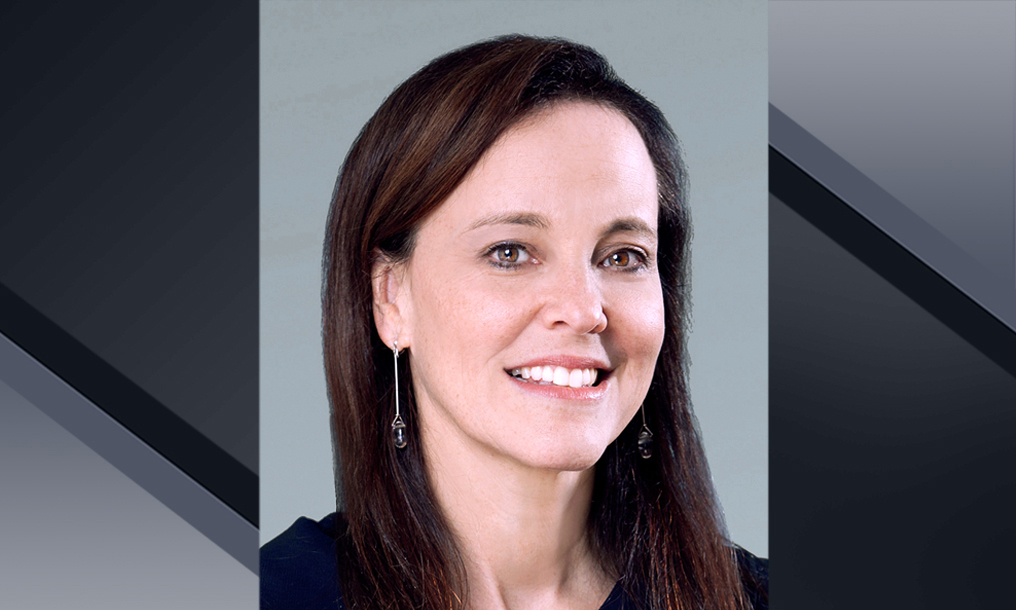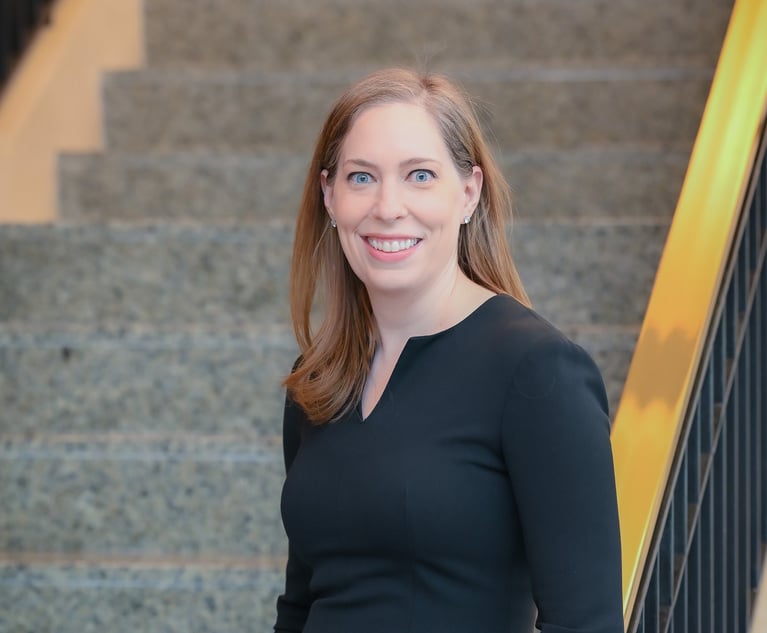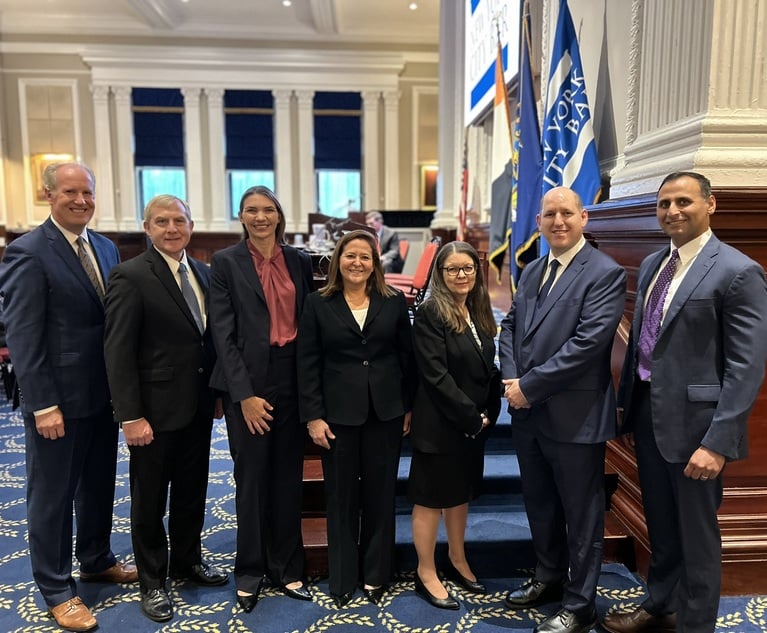Distinguished Leader: Susan Kohlmann
NY Managing Partner, Jenner & Block
October 17, 2019 at 11:15 AM
4 minute read
 Susan Kohlmann, NY Managing Partner, Jenner & Block
Susan Kohlmann, NY Managing Partner, Jenner & Block
What are some of your proudest recent achievements? I'm a member of the firm team representing, together with the Rule of Law Clinic at Yale Law School, the NAACP and Prince George's County, Maryland in its lawsuit against the federal government over unconstitutional census preparations. In the 2010 Census, the county, which has a majority African American population, suffered a 2.3 percent net undercount—the largest net undercount of any county in Maryland and one of the largest of any county in the nation. This is significant because census results determine the number of congressional seats and federal funding each state receives, the redrawing of legislative district lines and the enforcement of voting rights laws. The lawsuit seeks to compel the Census Bureau to prepare for and conduct a full and fair 2020 Census, as the Constitution requires. In January 2019, the bureau's motion to dismiss the lawsuit was denied. I'm also about to argue in the Ninth Circuit to defend the jury verdict we won on behalf the Estate of Elaine Steinbeck. I am hopeful this will be the final step in many years of litigation over the rights to John Steinbeck's iconic works.
What does it mean to be a leader? I believe the best leaders are team players focused on the achievement of the team as a whole. They have to be good listeners, open to new ideas, and willing to put in the time and energy to help each member of the team have their opportunity to shine.
Name a lawyer or mentor whose leadership inspired you. My mother, who came to this country in her teens, speaking no English and having to start life over, has always been a huge inspiration. She became a leader in her profession, a working mother and a role model. She has always said to never sell yourself short. It's a resolve that I would not have kept had I at any point believed that I was bound by the constraints of an old boys' club.
As a young litigator handling complex commercial cases, I was also fortunate to work with a woman who suggested that I try trademark work, which I did. I also worked on a matter involving Andy Warhol's estate in copyright ownership disputes. From there, my focus on trademark and copyright matters took off.
How are the business and profession of law changing, and how should lawyers adapt for the future? Sometimes, it seems change happens too slowly. The business and profession have long recognized the need for increased diversity and inclusion, but the numbers have not moved significantly. As technology changes the way we communicate, the pace of our interactions, and the very business of law, concretely changing the diversity of our profession has become ever more important. A multifaceted strategy of diversity initiatives to hire, retain, and promote ethnic and gender diversity and inclusion is critical to the future of the profession.
What is the best advice for someone considering a career in law, or someone already in the profession who is seeking to make a greater impact? There has never been a more important time to be a lawyer. I think, in the beginning of your career, it's easy to have an idea set in your mind of what your career will look like and to feel chained to that idea once you've committed to it. What I've learned is that you cannot plan for everything, and being open to change and having the courage to take on risk can lead you down a new path that may even be more fruitful and fulfilling.
This content has been archived. It is available through our partners, LexisNexis® and Bloomberg Law.
To view this content, please continue to their sites.
Not a Lexis Subscriber?
Subscribe Now
Not a Bloomberg Law Subscriber?
Subscribe Now
NOT FOR REPRINT
© 2025 ALM Global, LLC, All Rights Reserved. Request academic re-use from www.copyright.com. All other uses, submit a request to [email protected]. For more information visit Asset & Logo Licensing.
You Might Like
View All
Elizabeth Cooper of Simpson Thacher on Building Teams in a 'Relationship Business'
4 minute read
For Paul Weiss, Progress Means 'Embracing the Uncomfortable Reality'
5 minute read
Kenneth Feinberg Had Dreams of Being on the Big Screen. His 9/11 Victims Fund Gave Him an Unexpected Star Turn

City Bar Holds 32nd Annual Henry L. Stimson Medal Presentation
Trending Stories
- 1SurePoint Acquires Legal Practice Management Company ZenCase
- 2Day Pitney Announces Partner Elevations
- 3The New Rules of AI: Part 2—Designing and Implementing Governance Programs
- 4Plaintiffs Attorneys Awarded $113K on $1 Judgment in Noise Ordinance Dispute
- 5As Litigation Finance Industry Matures, Links With Insurance Tighten
Who Got The Work
J. Brugh Lower of Gibbons has entered an appearance for industrial equipment supplier Devco Corporation in a pending trademark infringement lawsuit. The suit, accusing the defendant of selling knock-off Graco products, was filed Dec. 18 in New Jersey District Court by Rivkin Radler on behalf of Graco Inc. and Graco Minnesota. The case, assigned to U.S. District Judge Zahid N. Quraishi, is 3:24-cv-11294, Graco Inc. et al v. Devco Corporation.
Who Got The Work
Rebecca Maller-Stein and Kent A. Yalowitz of Arnold & Porter Kaye Scholer have entered their appearances for Hanaco Venture Capital and its executives, Lior Prosor and David Frankel, in a pending securities lawsuit. The action, filed on Dec. 24 in New York Southern District Court by Zell, Aron & Co. on behalf of Goldeneye Advisors, accuses the defendants of negligently and fraudulently managing the plaintiff's $1 million investment. The case, assigned to U.S. District Judge Vernon S. Broderick, is 1:24-cv-09918, Goldeneye Advisors, LLC v. Hanaco Venture Capital, Ltd. et al.
Who Got The Work
Attorneys from A&O Shearman has stepped in as defense counsel for Toronto-Dominion Bank and other defendants in a pending securities class action. The suit, filed Dec. 11 in New York Southern District Court by Bleichmar Fonti & Auld, accuses the defendants of concealing the bank's 'pervasive' deficiencies in regards to its compliance with the Bank Secrecy Act and the quality of its anti-money laundering controls. The case, assigned to U.S. District Judge Arun Subramanian, is 1:24-cv-09445, Gonzalez v. The Toronto-Dominion Bank et al.
Who Got The Work
Crown Castle International, a Pennsylvania company providing shared communications infrastructure, has turned to Luke D. Wolf of Gordon Rees Scully Mansukhani to fend off a pending breach-of-contract lawsuit. The court action, filed Nov. 25 in Michigan Eastern District Court by Hooper Hathaway PC on behalf of The Town Residences LLC, accuses Crown Castle of failing to transfer approximately $30,000 in utility payments from T-Mobile in breach of a roof-top lease and assignment agreement. The case, assigned to U.S. District Judge Susan K. Declercq, is 2:24-cv-13131, The Town Residences LLC v. T-Mobile US, Inc. et al.
Who Got The Work
Wilfred P. Coronato and Daniel M. Schwartz of McCarter & English have stepped in as defense counsel to Electrolux Home Products Inc. in a pending product liability lawsuit. The court action, filed Nov. 26 in New York Eastern District Court by Poulos Lopiccolo PC and Nagel Rice LLP on behalf of David Stern, alleges that the defendant's refrigerators’ drawers and shelving repeatedly break and fall apart within months after purchase. The case, assigned to U.S. District Judge Joan M. Azrack, is 2:24-cv-08204, Stern v. Electrolux Home Products, Inc.
Featured Firms
Law Offices of Gary Martin Hays & Associates, P.C.
(470) 294-1674
Law Offices of Mark E. Salomone
(857) 444-6468
Smith & Hassler
(713) 739-1250






